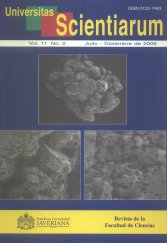Abstract
La obtención biotecnológica de compuestos biológicos con interés farmacológico ha adquirido un gran interés debido a que los procesos de síntesis química terminan siendo dispendiosos y contaminantes. El crecimiento del mercado de sabores, fragancias y pigmentos para el uso en alimentos, bebidas, cosméticos y detergentes, requiere nuevas estrategias de producción que no sean nocivas para el medio ambiente. Este cambio de mentalidad se basa en la idea de una nutrición sana, natural y económica, debido a que las fuentes de estos compuestos al ser de origen biológico son menos costosas y de fácil acceso. Los hongos por presentar un alto crecimiento y desarrollo, permiten que a través del metabolismo primario de fuentes precursoras, se logre la obtención de sus metabolitos secundarios, como sustancias de interés industrial por medio de procesos biotecnológicos, lo cual ha generado una alta expectativa en su uso. Como objetivo de esta revisión se pretende acercar al lector a una visión actualizada de numerosas e interesantes posibilidades de bioproducción de sustancias utilizadas en la industria como carotenoide, 6-pentil-á-pirona-2-feniletanol (2-PE) entre otros.Univ. Sci. is registered under a Creative Commons Attribution 4.0 International Public License. Thus, this work may be reproduced, distributed, and publicly shared in digital format, as long as the names of the authors and Pontificia Universidad Javeriana are acknowledged. Others are allowed to quote, adapt, transform, auto-archive, republish, and create based on this material, for any purpose (even commercial ones), provided the authorship is duly acknowledged, a link to the original work is provided, and it is specified if changes have been made. Pontificia Universidad Javeriana does not hold the rights of published works and the authors are solely responsible for the contents of their works; they keep the moral, intellectual, privacy, and publicity rights. Approving the intervention of the work (review, copy-editing, translation, layout) and the following outreach, are granted through an use license and not through an assignment of rights. This means the journal and Pontificia Universidad Javeriana cannot be held responsible for any ethical malpractice by the authors. As a consequence of the protection granted by the use license, the journal is not required to publish recantations or modify information already published, unless the errata stems from the editorial management process. Publishing contents in this journal does not generate royalties for contributors.



